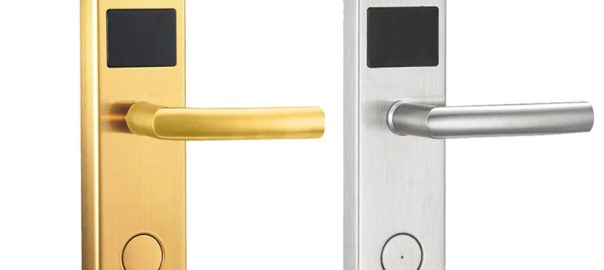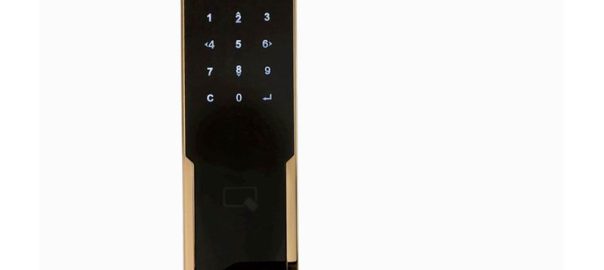
Four Types of Hotel Door Locks
Travelers prioritize security when choosing lodging — whether on business or vacation. That’s why efficient hotel door locks are key to guest experience and safety.
Magstripe, pin code and Bluetooth locks are modern choices for forward-thinking hotels. These types of lock systems offer guests easy self-check in and bypass at the front desk without compromising on security.
Keycard Locks
Key card locks are a popular keyless entry solution for commercial and multifamily properties. They work by replacing a brass key with a plastic card that acts as the credential. When the tenant waves their card in front of the door lock reader, the RFID technology quickly communicates their information and verifies authorized access to the unit. The tenant is then able to enter the room and close the door behind them.
These magnetic stripe based systems typically store the hotel guest’s room number and an expiration date in the magstripe of each card. The card is scanned when the guest wants to use their room and the system compares the stored data to the information on file in the hotel’s property management system.
Some key card lock systems have a mechanical bypass in case of loss of power, so they still function even without a central controller hotel door locks or communication between the lock and the hotel’s database. However, the lack of a centralized system can make it more difficult to upgrade or integrate this type of technology with a hotel’s existing IT architecture.
In order to prevent unauthorized access, hotels should always ensure the lock is properly functioning before guests enter their rooms. This includes checking that the deadbolt is fully engaged and using the peephole to check who’s on the other side before opening the door.
Digital Locks
Digital locks are a popular choice for hotel guests to use to unlock their rooms. These locks communicate with guest’s mobile devices via Bluetooth, allowing them to check-in and check-out without the need to hand over a physical key card. In addition, digital locks can help hotels manage room occupancy better through automated self-check-in and contactless payment processes.
The main suppliers of digital hotel door locks are Assa Abloy, Onity, Salto, and SmartKey. These lock systems can be used with a variety of key cards, including plastic magstripe and RFID (or contactless) cards.
In recent years, smart technology is rapidly transforming the way hotels operate. The most exciting innovation is the ability for hotels to offer their guests a digital hotel key directly on their smartphone. This is possible with the use of a Bluetooth Low Energy (BLE) lock connected to a dedicated app on a mobile device.
Using BLE locks and the right hospitality management software system allows hotel staff to remotely manage access permissions for their guests. This will allow your hotel to improve guest experience and reduce overall operating costs. However, implementing a mobile hotel door lock requires a careful selection of hardware. It’s important to choose a system that works with the existing hotel structures and access systems, while providing flexibility for future expansion and upgrades. A good example is Fin-In’s electronic lock that can be adapted to existing mechanical locks by adding magnetic swipe or RFID functionality, while maintaining the appearance of the existing escutcheon.
Mortise Locks
Mortise locks use a heavy bolt that fits into a pocket in the door frame to lock. They’re commonly found in multi-unit residential and commercial apartment buildings as well as some hotels. They can be used for both interior and exterior doors. They have four parts: the lock body, the strike plate, the keeper and the deadbolt. A hotel door with a mortise lock will also have a lever or handle set.
Combining a smart lock with a smartphone app can add a new level of convenience for guests. These locks allow guests to unlock the door with a mobile phone number and can also be used to lock the doors automatically after check out. However, this type of technology is still fairly new and there are some security risks to consider.
Keycard hotel locks are an efficient way to grant access to rooms without requiring staff to be present. These types of locks are available in both cylindrical and mortise designs. Magnetic stripe cards (also known as swipe card) are scanned by a sensor in the lock that compares its contents to those stored either locally or remotely in an online database.
Whether you’re looking to upgrade your current locks or install them in a new hotel, smart lock technology is an ideal choice for both traditional and modern rooms. These locks can be easily configured and managed from a single web dashboard, and are compatible with many of the most popular software solutions.
Swing Bar Door Guards
Swing bar door guards are the type of security device you might see in a hotel room, offering a bit more strength than chains but still less force-resistant than a mortise lock. They cost about $20 and come with fasteners for easy installation. They allow homeowners to slightly open their doors for viewing and ventilation while retaining home security — useful if your home lacks a peephole. They also tend to leave fewer scratch marks on your doorframe than traditional chains, though they’re not entirely resistant to prying and can be easily disengaged by special tools (looks like a pry bar).
You can purchase these devices as standalone items or in kits. They are usually made of steel or aluminum and can withstand a lot of force, making them hotel door locks much more difficult to break into than your basic strike plate. They can be installed in place of your strike plates, hinge guards and/or wedges to help defend your home from the kind of kick-in entry often seen by thieves.
Some states require that all guest rooms have a door security device, as well as fire-rated doors. However, these door locks can be popped open with a special emergency release tool that allows hotel staff and emergency personnel immediate access to rooms in case of fire or other disaster.









